- Home
- Sue Grafton
U Is for Undertow
U Is for Undertow Read online
Table of Contents
Title Page
Copyright Page
Dedication
Acknowledgements
Chapter 1 - Wednesday afternoon, April 6, 1988
Chapter 2
Chapter 3 - DEBORAH UNRUH
Chapter 4 - Thursday morning, April 7, 1988
Chapter 5
Chapter 6 - DEBORAH UNRUH
Chapter 7 - Thursday afternoon, April 7, 1988
Chapter 8
Chapter 9 - WALKER MCNALLY
Chapter 10 - Friday, April 8, 1988
Chapter 11
Chapter 12 - WALKER MCNALLY
Chapter 13 - Monday, April 11, 1988
Chapter 14
Chapter 15 - JON CORSO
Chapter 16 - Wednesday, April 13, 1988
Chapter 17
Chapter 18 - JON CORSO
Chapter 19 - Wednesday afternoon, April 13, 1988
Chapter 20
Chapter 21 - DEBORAH UNRUH
Chapter 22 - Thursday night, April 14, 1988
Chapter 23 - Friday afternoon, April 15, 1988
Chapter 24 - WALKER MCNALLY
Chapter 25 - Monday, April 18, 1988
Chapter 26
Chapter 27 - JON CORSO
Chapter 28 - Wednesday afternoon, April 20, 1988
Chapter 29 - WALKER MCNALLY
Chapter 30 - Wednesday evening, April 20, 1988
Chapter 31 - JON CORSO
Chapter 32 - Thursday, April 21, 1988
Chapter 33 - Thursday, April 21, 1988
EPILOGUE
ALSO BY SUE GRAFTON
Kinsey Millhone mysteries
A is for Alibi
B is for Burglar
C is for Corpse
D is for Deadbeat
E is for Evidence
F is for Fugitive
G is for Gumshoe
H is for Homicide
I is for Innocent
J is for Judgment
K is for Killer
L is for Lawless
M is for Malice
N is for Noose
O is for Outlaw
P is for Peril
Q is for Quarry
R is for Ricochet
S is for Silence
T is for Trespass
A MARIAN WOOD BOOK
Published by G. P. Putnam’s Sons
Publishers Since 1838
a member of the Penguin Group
Penguin Group (USA) Inc., 375 Hudson Street, New York, New York 10014, USA
Penguin Group (Canada), 90 Eglinton Avenue East, Suite 700, Toronto, Ontario M4P 2Y3, Canada (a division of Pearson Penguin Canada Inc.) • Penguin Books Ltd, 80 Strand, London WC2R 0RL, England •
Penguin Ireland, 25 St Stephen’s Green, Dublin 2, Ireland (a division of Penguin Books Ltd)
Penguin Group (Australia), 250 Camberwell Road, Camberwell, Victoria 3124, Australia (a division of Pearson Australia Group Pty Ltd) • Penguin Books India Pvt Ltd, 11 Community Centre, Panchsheel Park, New Delhi-110 017, India • Penguin Group (NZ), 67 Apollo Drive, Rosedale, North Shore 0632, New Zealand (a division of Pearson New Zealand Ltd)
Penguin Books (South Africa) (Pty) Ltd, 24 Sturdee Avenue, Rosebank, Johannesburg 2196, South Africa
Penguin Books Ltd, Registered Offices: 80 Strand, London WC2R 0RL, England
Copyright © 2009 by Sue Grafton
All rights reserved. No part of this book may be reproduced, scanned, or distributed in any printed or electronic form without permission. Please do not participate in or encourage piracy of copyrighted materials in violation of the author’s rights. Purchase only authorized editions.
Published simultaneously in Canada
Library of Congress Cataloging-in-Publication Data
Grafton, Sue.
U is for undertow / Sue Grafton.
p. cm.
eISBN : 978-1-101-15161-7
1. Millhone, Kinsey (Fictitious character)—Fiction. 2. Women private investigators—California—Fiction. 3. Girls—Crimes against—Fiction. I. Title.
PS3557.R13U
813’.54—dc22
This is a work of fiction. Names, characters, places, and incidents either are the product of the author’s imagination or are used fictitiously, and any resemblance to actual persons, living or dead, businesses, companies, events, or locales is entirely coincidental.
While the author has made every effort to provide accurate telephone numbers and Internet addresses at the time of publication, neither the publisher nor the author assumes any responsibility for errors, or for changes that occur after publication. Further, the publisher does not have any control over and does not assume any responsibility for author or third-party websites or their content.
http://us.penguingroup.com
For Larry Welch, who left us,
steering a course for ports unknown,
and for Pam, who sails on,
navigating her journey over high seas.
Safe passage to you both.
ACKNOWLEDGMENTS
The author wishes to acknowledge the invaluable assistance of the following people: Steven Humphrey; Sam Eaton, Eaton and Jones, Attorneys at Law; John Mackall, Attorney at Law, Seed Mackall LLP; Bill Turner, Detective Sergeant (retired), Santa Barbara County Sheriff’s Department; Deborah Linden, Chief of Police, San Luis Obispo; Mary Ellen Tiffany, Vice President Business Development, Montecito Bank & Trust; Penny Braniff and Krys Jackson, Hope Ranch Park Homes Association; Special Agent Leane Blevins, Federal Bureau of Investigation, Ventura field office; Lisa Lowseth, DVM; Amy Taylor, Veterinary Technician, Cat Doctors; Susan Burke, Librarian, Laguna Blanca School; Diane Miller, Assistant Dean, Helen Bader School of Social Welfare, University of Wisconsin, Milwaukee; Kevin Frantz; Sally Giloth; Tracy Kanowsky; Suzanne Perkins; Steve Tipton; Kim Showalter; Jamie Clark; Susan Gulbransen; Joanna Barnes; and Sue Parks; along with a special thank-you to Margie and Keith Kirkendall, Patricia L. Erbe, M.D., and Jeffrey Grill, M.D., for the use of their names.
1
Wednesday afternoon, April 6, 1988
What fascinates me about life is that now and then the past rises up and declares itself. Afterward, the sequence of events seems inevitable, but only because cause and effect have been aligned in advance. It’s like a pattern of dominoes arranged upright on a tabletop. With the flick of your finger, the first tile topples into the second, which in turn tips into the third, setting in motion a tumbling that goes on and on, each tile knocking over its neighbor until all of them fall down. Sometimes the impetus is pure chance, though I discount the notion of accidents. Fate stitches together elements that seem unrelated on the surface. It’s only when the truth emerges you see how the bones are joined and everything connects.
Here’s the odd part. In my ten years as a private eye, this was the first case I ever managed to resolve without crossing paths with the bad guys. Except at the end, of course.
My name is Kinsey Millhone. I’m a private detective, female, age thirty-seven, with my thirty-eighth birthday coming up in a month. Having been married and divorced twice, I’m now happily single and expect to remain so for life. I have no children thus far and I don’t anticipate bearing any. Not only are my eggs getting old, but my biological clock wound down a long time ago. I suppose there’s always room for one of life’s little surprises, but that’s not the way to bet.
I work solo out of a rented bungalow in Santa Teresa, California, a town of roughly 85,000 souls who generate sufficient crime to occupy the Santa Teresa Police Department, the County Sheriff’s Department, the California Highway Patrol, and the twenty-five or so local private investigators like me. Movies and television shows would have you believe a PI’s job is dangerous, but nothing could
be farther from the truth . . . except, of course, on the rare occasions when someone tries to kill me. Then I’m ever so happy my health insurance premiums are paid up. Threat of death aside, the job is largely research, requiring intuition, tenacity, and ingenuity. Most of my clients reach me by referral and their business ranges from background checks to process serving, with countless other matters in between. My office is off the beaten path and I seldom have a client appear unannounced, so when I heard a tapping at the door to my outer office, I got up and peered around the corner to see who it was.
Through the glass I saw a young man pointing at the knob. I’d apparently turned the dead bolt to the locked position when I’d come back from lunch. I let him in, saying, “Sorry about that. I must have locked up after myself without being aware of it.”
“You’re Ms. Millhone?”
“Yes.”
“Michael Sutton,” he said, extending his hand. “Do you have time to talk?”
We shook hands. “Sure. Can I offer you a cup of coffee?”
“No, thanks. I’m fine.”
I ushered him into my office while I registered his appearance in a series of quick takes. Slim. Lank brown hair with a sheen to it, worn long on top and cut short over his ears. Solemn brown eyes, complexion as clear as a baby’s. There was a prep school air about him: deck shoes without socks, sharply creased chinos, and a short-sleeve white dress shirt he wore with a tie. He had the body of a boy: narrow shoulders, narrow hips, and long, smooth arms. He looked young enough to be carded if he tried to buy booze. I couldn’t imagine what sort of problem he’d have that would require my services.
I returned to my swivel chair and he settled in the chair on the other side of the desk. I glanced at my calendar, wondering if I’d set up an appointment and promptly forgotten it.
He noticed the visual reference and said, “Detective Phillips at the police department gave me your name and address. I should have called first, but your office was close by. I hope this isn’t an incon - venience.”
“Not at all,” I said. “My first name’s Kinsey, which you’re welcome to use. You prefer Michael or Mike?”
“Most people call me Sutton. In my kindergarten class, there were two other Michaels so the teacher used our last names to distinguish us. Boorman, Sutton, and Trautwein—like a law firm. We’re still friends.”
“Where was this?”
“Climp.”
I said, “Ah.” I should have guessed as much. Climping Academy is the private school in Horton Ravine, K through 12. Tuition starts at twelve grand for the little tykes and rises incrementally through the upper grades. I don’t know where it tops out, but you could probably pick up a respectable college education for the same price. All the students enrolled there referred to it as “Climp,” as though the proper appellation was just, like, sooo beside the point. Watching him, I wondered if my blue-collar roots were as obvious to him as his upper-class status was to me.
We exchanged pleasantries while I waited for him to unload. The advantage of a prearranged appointment is that I begin the first meeting with at least some idea what a prospective client has in mind. People skittish about revealing their personal problems to a stranger often find it easier to do by phone. With this kid, I figured we’d have to dance around some before he got down to his business, whatever it was.
He asked how long I’d been a private investigator. This is a question I’m sometimes asked at cocktail parties (on the rare occasion when I’m invited to one). It’s the sort of blah-blah-blah conversational gambit I don’t much care for. I gave him a rundown of my employment history. I skipped over the two lackluster semesters at the local junior college and started with my graduation from the police academy. I then covered the two years I’d worked for the Santa Teresa PD before I realized how ill suited I was to a life in uniform. I proceeded with a brief account of my subsequent apprenticeship with a local agency, run by Ben Byrd and Morley Shine, two private investigators, who’d trained me in preparation for licensing. I’d had my ups and downs over the years, but I spared him the details since he’d only inquired as a stalling technique. “What about you? Are you a California native?”
“Yes, ma’am. I grew up in Horton Ravine. My family lived on Via Ynez until I went off to college. I lived a couple of other places, but now I’m back.”
“You still have family here?”
His hesitation was one of those nearly imperceptible blips that in dicates internal editing. “My parents are gone. I have two older brothers, both married with two kids each, and an older sister who’s divorced. We’re not on good terms. We haven’t been for years.”
I let that pass without comment, being better acquainted with family estrangement than I cared to admit. “How do you know Cheney Phillips?”
“I don’t. I went into the police department, asking to speak to a detective, and he happened to be free. When I told him my situation, he said you might be able to help.”
“Well, let’s hope so,” I said. “Cheney’s a good guy. I’ve known him for years.” I shut my mouth then and let a silence descend, a stratagem with remarkable powers to make the other guy talk.
Sutton touched the knot in his tie. “I know you’re busy, so I’ll get to the point. I hope you’ll bear with me. The story might sound weird.”
“Weird stories are the best kind, so fire away,” I said.
He looked at the floor as he spoke, making eye contact now and then to see if I was following. “I don’t know if you saw this, but a couple of weeks ago, there was an article in the newspaper about famous kidnappings: Marion Parker, the twelve-year-old girl who was abducted in 1927; the Lindbergh baby in ’thirty-two; another kid, named Etan Patz. Ordinarily, I don’t read things like that, but what caught my attention was the case here in town . . .”
“You’re talking about Mary Claire Fitzhugh—1967.”
“You remember her?”
“Sure. I’d just graduated from high school. Little four-year-old girl taken from her parents’ home in Horton Ravine. The Fitzhughs agreed to pay the ransom, but the money was never picked up and the child was never seen again.”
“Exactly. The thing is, when I saw the name Mary Claire Fitzhugh, I had this flash—something I hadn’t thought about for years.” He clasped his hands together and squeezed them between his knees. “When I was a little kid, I was playing in the woods and I came across these two guys digging a hole. I remember seeing a bundle on the ground a few feet away. At the time, I didn’t understand what I was looking at, but now I believe it was Mary Claire’s body and they were burying her.”
I said, “You actually saw the child?”
He shook his head. “She was wrapped in a blanket, so I couldn’t see her face or anything else.”
I studied him with interest. “What makes you think it was Mary Claire? That’s a big leap.”
“Because I went back and checked the old newspaper accounts and the dates line up.”
“What dates?”
“Oh, sorry. I should have mentioned this before. She was kidnapped on July 19, which was a Wednesday. I saw the guys on Friday, July 21, 1967 . . . my birthday, the year I turned six. That’s how I made the association. I think she was already dead by then and they were getting rid of the body.”
“And this was where?”
“Horton Ravine. I don’t know the exact location. My mother had errands to run that day so she dropped me off at some kid’s house. I don’t remember his name. I guess his mom had agreed to look after me while she was gone. Turns out the other kid woke up with a fever and sore throat. Chicken pox was going around and his mom didn’t want me exposed in case that’s what it was, so she made him stay in his room while I hung around downstairs. I got bored and asked if I could go outside. She said I could as long as I didn’t leave the property. I remember finding this tree with branches that hung down to make a little room, so I played there for a while, pretending I was a bandit in a cool hideout. I heard voices and when I peeped th
rough the leaves, I saw the two guys walk by with shovels and stuff and I followed them.”
“What time of day?”
“Must have been late morning because after I came in again, the kid’s mother fed me lunch—a plain lettuce and tomato sandwich, no bacon, and it was made with Miracle Whip. Our family didn’t eat Miracle Whip. My mother wouldn’t have it in the house. She said it was disgusting compared to real homemade mayonnaise.”
“Your mother made mayonnaise?”
“The cook did.”
“Ah.”
“Anyway, Mom always said it was rude to complain, so I ate what I could and left the rest on my plate. The kid’s mom hadn’t even cut the crusts off the bread.”
“There’s a shock,” I said. “I’m impressed your memory’s so clear.”
“Not clear enough or I wouldn’t be here. I’m pretty sure the two guys I saw were the ones who abducted Mary Claire, but I have no idea where I was. I know I’d never been to the house before and I never went there again.”
“Any chance one of your siblings would remember who the kid was?”
“I guess it’s possible. Unfortunately, we don’t get along. We haven’t spoken in years.”
“So you said.”
“Sorry. I don’t mean to repeat myself. The point is, I can’t call them up out of a clear blue sky. Even if I did, I doubt they’d talk to me.”
“But I could ask, couldn’t I? That would be the obvious first move if you’re serious about this.”
He shook his head. “I don’t want them involved, especially my sister, Dee. She’s difficult. You don’t want to mess with her.”
“All right. We’ll scratch that for now. Maybe the kid’s mother was being paid to babysit.”
“That wasn’t my impression. More like she was doing Mom a favor.”
“What about your classmates? Maybe she left you with one of the other moms, like a playdate.”

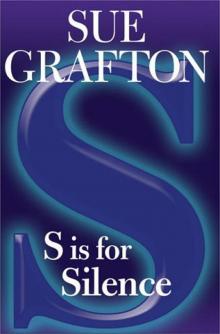 S Is for Silence
S Is for Silence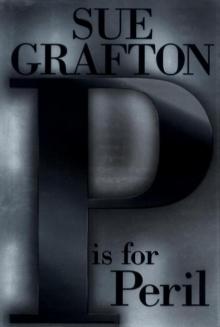 P Is for Peril
P Is for Peril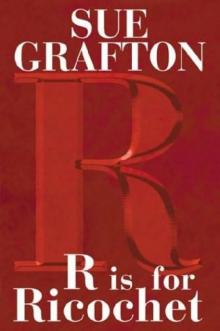 R Is for Ricochet
R Is for Ricochet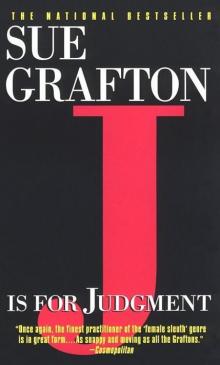 J Is for Judgment
J Is for Judgment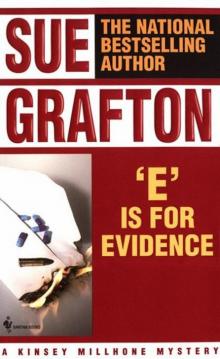 E Is for Evidence
E Is for Evidence T Is for Trespass
T Is for Trespass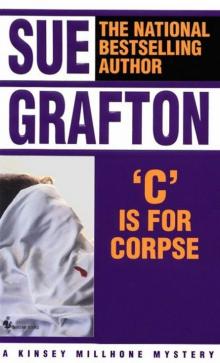 C Is for Corpse
C Is for Corpse U Is for Undertow
U Is for Undertow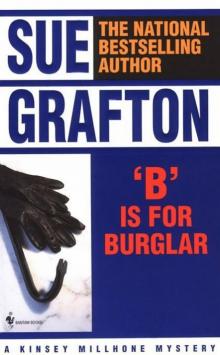 B Is for Burglar
B Is for Burglar Four Sue Grafton Novels
Four Sue Grafton Novels D Is for Deadbeat
D Is for Deadbeat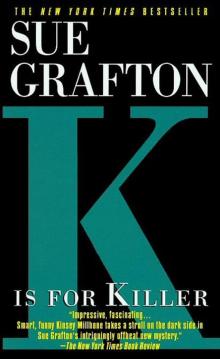 K Is for Killer
K Is for Killer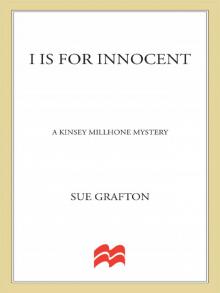 I Is for Innocent
I Is for Innocent A Is for Alibi
A Is for Alibi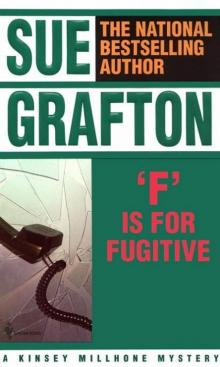 F Is for Fugitive
F Is for Fugitive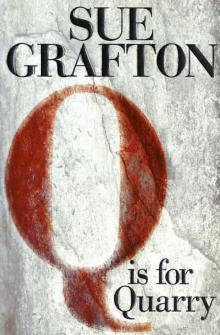 Q Is for Quarry
Q Is for Quarry W Is for Wasted
W Is for Wasted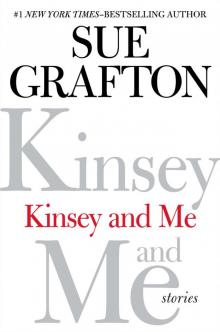 Kinsey and Me: Stories
Kinsey and Me: Stories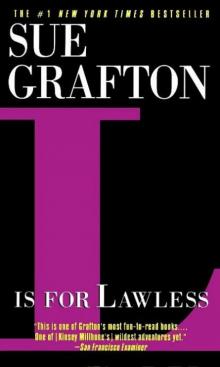 L Is for Lawless
L Is for Lawless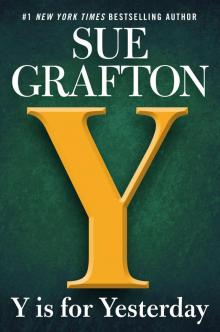 Y Is for Yesterday
Y Is for Yesterday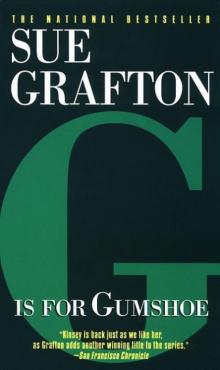 G Is for Gumshoe
G Is for Gumshoe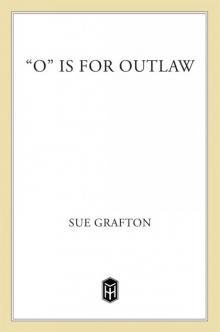 O Is for Outlaw
O Is for Outlaw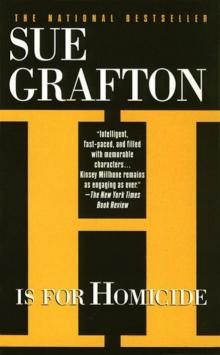 H Is for Homicide
H Is for Homicide X
X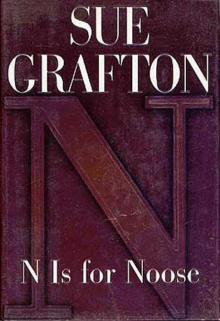 N Is for Noose
N Is for Noose Three Complete Novels: A Is for Alibi / B Is for Burglar / C Is for Corpse
Three Complete Novels: A Is for Alibi / B Is for Burglar / C Is for Corpse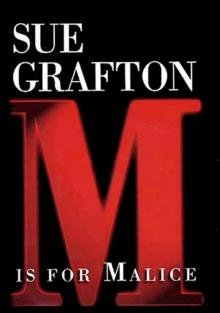 M Is for Malice
M Is for Malice I is for INNOCENT
I is for INNOCENT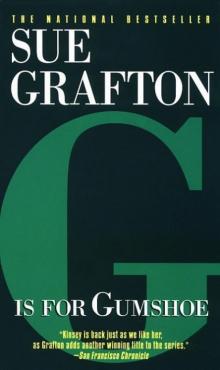 G is for GUMSHOE
G is for GUMSHOE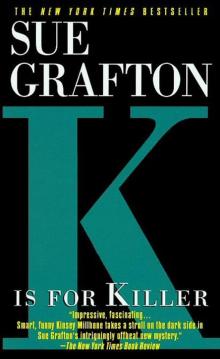 K is for KILLER
K is for KILLER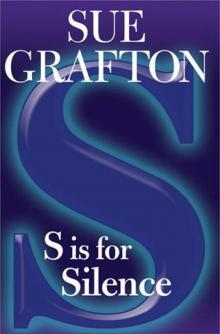 S is for SILENCE
S is for SILENCE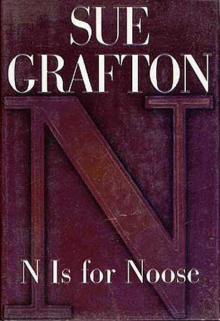 N is for NOOSE
N is for NOOSE D is for DEADBEAT
D is for DEADBEAT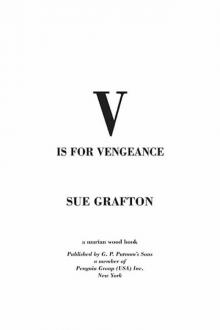 V is for Vengeance
V is for Vengeance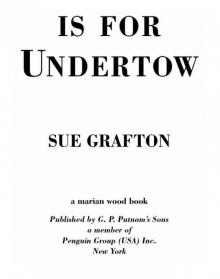 U is for Undertow
U is for Undertow W Is for Wasted km-23
W Is for Wasted km-23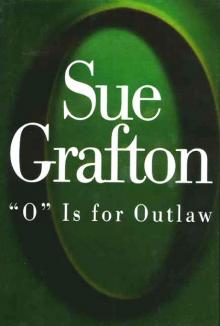 O is for OUTLAW
O is for OUTLAW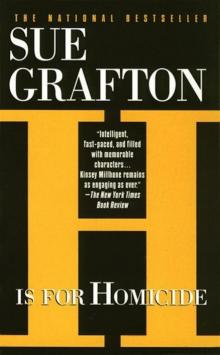 H is for HOMICIDE
H is for HOMICIDE Sue Grafton Novel Collection
Sue Grafton Novel Collection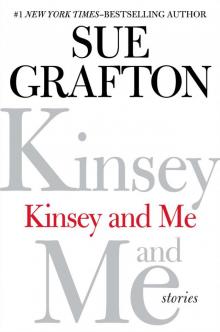 Kinsey and Me
Kinsey and Me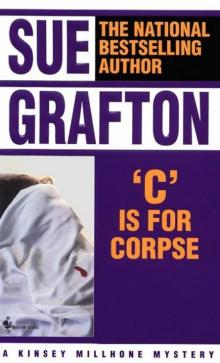 C is for CORPSE
C is for CORPSE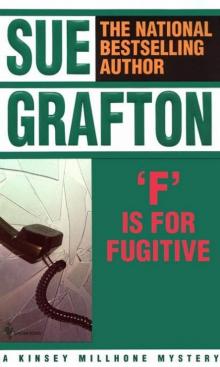 F is for FUGITIVE
F is for FUGITIVE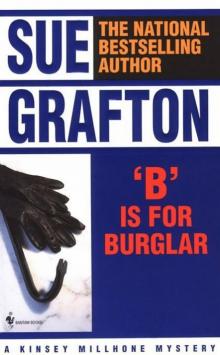 B is for BURGLAR
B is for BURGLAR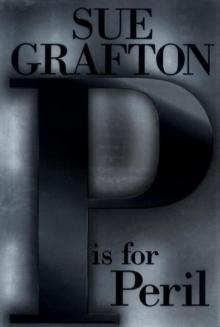 P is for PERIL
P is for PERIL A is for ALIBI
A is for ALIBI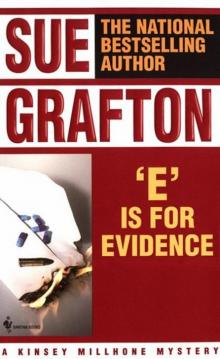 E is for EVIDENCE
E is for EVIDENCE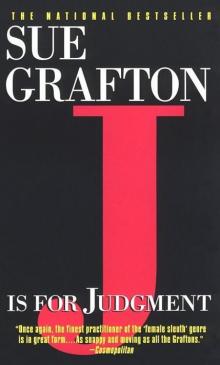 J is for JUDGMENT
J is for JUDGMENT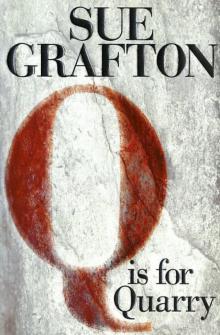 Q is for QUARRY
Q is for QUARRY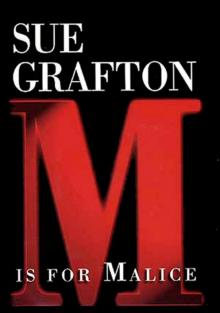 M is for MALICE
M is for MALICE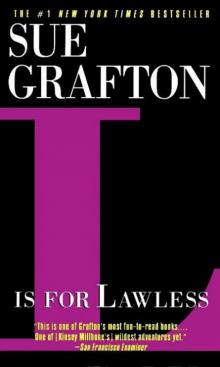 L is for LAWLESS
L is for LAWLESS